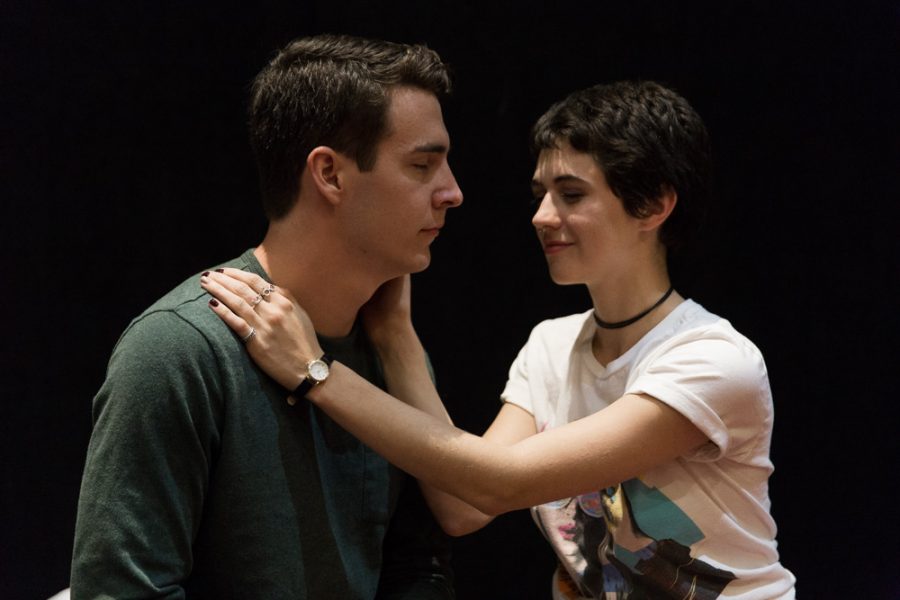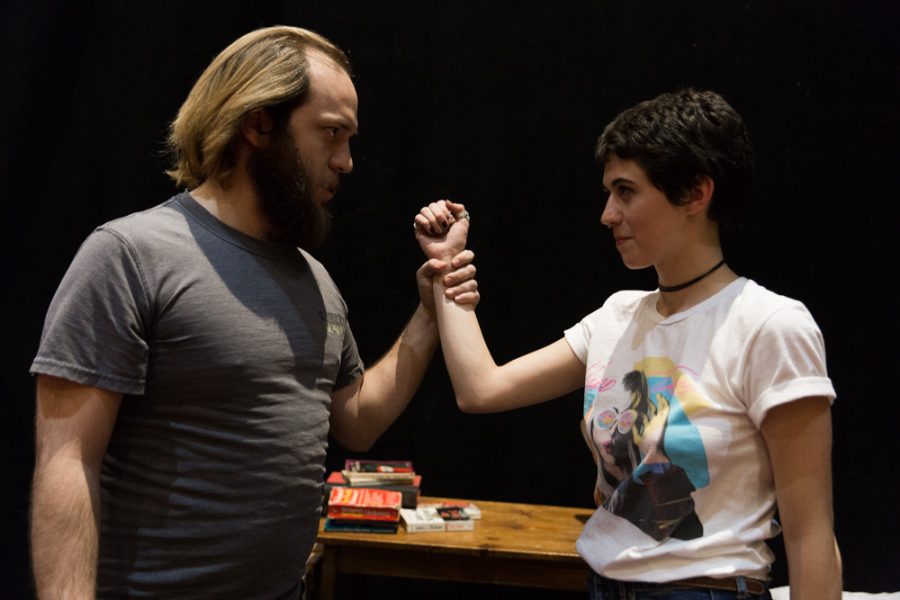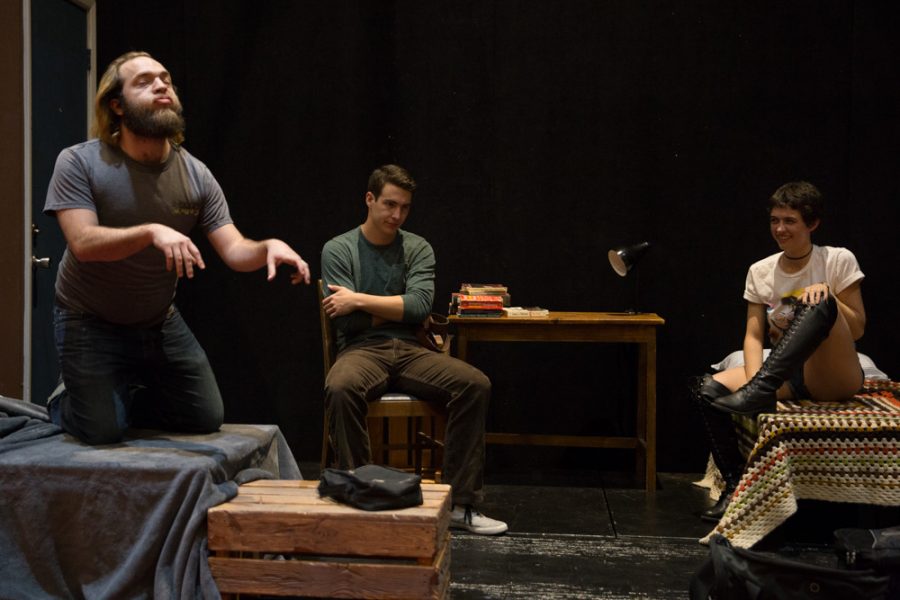Tags
Related Posts
Share This
Cast of Red Light Winter
As the cast of Red Light Winter prepares for opening night, Jackalope Magazine sits down with its main cast members: seniors Donna Bella Litton, Koppany Pusztai and alumnus Hamilton Turner. Litton graduates this coming December with a BFA in Musical Theater, Pisztai will graduate in May with a BFA in Acting and Turner graduated from the Performing Arts department in 2015. They talk about their process for approaching a new script and their artistic journeys. Red Light Winter will be directed by Triston Pullen and goes up in the Greer Garson Theater lobby at 7 p.m., Nov. 17 and 18 with free admission.
Jackalope: Who is your character in Red Light Winter?
Donna Belle Litton: I play Christina, she is a prostitute in the red light district when we first meet her. She meets these two guys; one she becomes enamored with while the other becomes enamored with her. It becomes a triangle of people trying to fill their emptiness with each other. She is incredibly smart and knows how to manipulate people, but still can’t seem to take a look at herself or find her lot in life or where she’s going to be successful. It’s a painfully human story in that way.
Hamilton Turner: I play Davis—he is the character with the least moral compass.
Koppnay Pusztai: I play Matt. He is a playwright, best friends with Davis and the one that falls madly in love with Christina. He is close to Davis because he has just been the one to stick around and they enjoy not going out together. Matt spends most of his time cooped up inside, writing all the time. Davis cares what happens to Matt, even if it is in the lowest form. They definitely bug each other a lot and they make each other very angry, probably not healthy for each other, but Matt is not going out in the world to find new friends.
As an actor, how do you approach new roles? What is your process?
DL: To me, it’s not about feeling what the character is feeling; it’s about pursuing what the character needs to pursue. I like to stay separate from the character, especially with a play like this because it has such heavy subject matter. A lot of the time, directors or other actors will say to address your character as ‘I’ rather than ‘she or he.’ I think that is great, sometimes I do it and sometimes I don’t. I probably won’t for this show. I like to go from the objective; what is the character’s objective in the whole show? Then break it down scene by scene, and how does the character get from moment to moment. My freshman year, I had a director describe the objective as finding out what you need the other characters to do. That clicked to me as a better way to stay out of your head when devolving a character.
HT: It’s different for every role and character, it always requires something different; a different piece of you from a different place, whether mindset or physicality or what have you. The process is different and one that I approach with an open mind and take what is given to me from the script. I think that is the most important thing, all the information is given to you and you just need to piece it together.
KP: As far as character work, I do a little even before rehearsal, just initial ideas I get from my first few readings of the script. There are always clues in the text and because English is my second language, repetition and just reading the script from beginning to end as much as possible is the way I learn the arc, the plot. Then I take that into rehearsal where it’s all about discovery. For me, it’s not just my own building blocks of the character, but also the relationships to the other characters on stage. Especially when you have a friendship like Matt and Davis who have been friends for the span of a few years, you help form each other positive or negative. A lot of it is that discovery throughout, but also the clues from the script and what the director brings to your attention.
How did you all get involved with this show?
HT: Really, Triston just approached me and I really like the script. It was good and dark.
DL: There was a brief audition period, where we were all reading for the roles he though he wanted us in. So, we were all really brought together by Triston. I was very attracted to the script; it’s dark, but it’s got so much thought and layers to it, which is so exciting for an actor, because sometimes you get a script and go, ‘Great I have to create everything from nothing’. But this script isn’t like that. It makes our job so much easier.
KP: Well, Triston approached all of us and we all knew him in one way or another and he said he wanted to do this thing, this show for his senior thesis. He handed me the scripts, and I’ll be honest with you, I was shocked. It is a very shocking story, terribly shocking. I had never heard of the play before.
What have been the challenges with this play?
DL: This project is interesting because, as a performer, I like to do a lot on stage and have business on stage. It’s hard for me to just sit still, and I have had to do a lot of sitting still with this role. It sounds really boring but for me, as an actor, it has been a big challenge. It’s fun to find the energy and motivation that sits in stillness. You may not think that of being still, but on stage you still have to be present even while still.
HT: I was having a problem approaching this character because normally a good place to start with a character is their moral compass, to find their values. That dictates how, as a character, you would approach the situations of the play. Even bad guys have a code, and it’s been really hard nailing down a code for this character.
KP: I don’t think, personally, I am equipped intellectually enough to be a playwright. I wish I were and hope someday I will be. Right now at least I don’t think I have experienced enough about it to write my own play. But then we have Matt who is and was an English major and playwright dramatist. I think playing an intellectual character that thinks too much is what’s challenging me. I think what I bring to the character that I have confidence in is that I do have experiences that provided me street smarts. So I can bring those experiences and a certain humanity that just as well brings life to a character.
What do you feel artistically speaks to you about the play?
KP: So he handed me the scripts and I came in the next day to rehearsal for a different production and he looked at me and said, ‘So what do you think?’ I looked at him and said, ‘ I couldn’t finish it. I had to take a break after Act One. I’ll start it back tonight.’ I couldn’t finish it. Then it’s the second act that really breaks your heart. Then when I finished, it I cried. I think the play truly speaks to the value we put on sexual relationships, especially for people our age about how twisted and messy it can get. But you know these character are really human and the script is really wordy and artistic, but that’s people. The playwright was writing about his own life in many ways. I think that is going to be our biggest challenge, connecting with the words and delivering them correctly.
DL: Especially in a setting like this, which makes it even more intimate because we are so close to the audience.
HT: Perfect way to describe the play is actually one of the playwright’s own lines, ‘He gets the fury with the joy.’
DL: Our stage manager, Kristina [Watkins], said early that it was, ‘Sympathy vs Empathy vs Compassion’ and for me that feels like the pinnacle of the play. It is very human, everyone can relate to it. Sometimes you get a play about humanity and it’s very generic, but Red Light Winter takes it to a whole new level.
KT: The second time I read the script it kind of hit me. Like, have you ever been in a public place and then realized that all the people around you have a story and are going through stuff just like you are? Then you go down this rabbit hole of what are they thinking, why are they here, what are they going home to? You keep going and going. I think that there is a piece of this play that embodies that — the ugly resolving into a sadness but a beauty too.
DL: It’s the discovery of empathy. I feel like the challenge for me with the language is that at times it is so conversational that it is hard to find the conflict. So now I have to really dive in to the subtext and project that on stage. You have to make it life or death. You have to raise the stakes.
KP: Yeah it’s scary. I can honestly say that even after this first read through, that the challenges we are going to face are going to be faced with each other, including Triston, the director. This play is so intimate that it is so close to the chest.
HT: It’s going to be about the passing of energy between us and the audience. The physical act of some of the stuff we are doing, they will disagree with. And it will be interesting to see when that energy comes back to us and how that feels.
DL: This play is amazing because it inspires conversations about the darker side of life. It may seem scary but it is the excitement of diving into a show that actually means something.
KP: And honestly, there are some things that just need to be talked about right now. Sex, drugs, disease, mental health, these are all things addressed in this play. These things exist and we are flashing it to the audience, making them think and talk about these issues.
DL: This play will get people talking, no doubt.
KP: Theater is meant to show the ugly parts of life. Tell them when they are wrong, but you also have to give them a little hope.
What do you think your role is as an actor?
DL: To be honest, is the simplest way to put it. I just had the opportunity to judge at the New Mexico Thespian Festival for individual events, and the one thing that stood out to me that I had never noticed to this magnitude, is that you can tell if someone is really being genuine with their performance or not. Different people have ways of going about it, but for me it really goes back to action and objective. My main job as an actor is to make sure I am pursuing that objective, because that in turn will be a truthful performance.
HT: It’s much more than memorizing your lines, where you stand and how you say the lines. It’s finding the reasoning and purpose and then pursuing that. I try to spend as much time as I can in the script, because that is where all your answers should come from. If you can find an answer in the script and justify it with the lines in the script, then you are generally justified. As long as you are finding and doing justified things, your work is right in my opinion. So it’s about finding that justification and finding the reasoning for why the character moves forward.
KP: Personally, I don’t think I would be able to communicate with you today if it was not for theater, and so it holds a special place in my heart because it’s the reason I speak English. Once I found theater, I found a good group of friends, and my love for acting, and really started growing out of my shell. So part of it is participation, I want other people to participate and not only enjoy themselves, but learn something. Now I am the one that is inviting others to come and open a space up, whereas before theater I was so shy. The bigger part of my work is that I embody different characters as myself to explore a different side to that person, and to show the humanity objectively. I do whatever I have to do to show as much truth as possible and if people receive that, I am doing my job well.









 Jackalope Magazine is the student magazine of Santa Fe University of Art and Design. Building on the interdisciplinary nature of our education, we aim to showcase the talent of our university and character of our city.
Jackalope Magazine is the student magazine of Santa Fe University of Art and Design. Building on the interdisciplinary nature of our education, we aim to showcase the talent of our university and character of our city.
Recent Comments